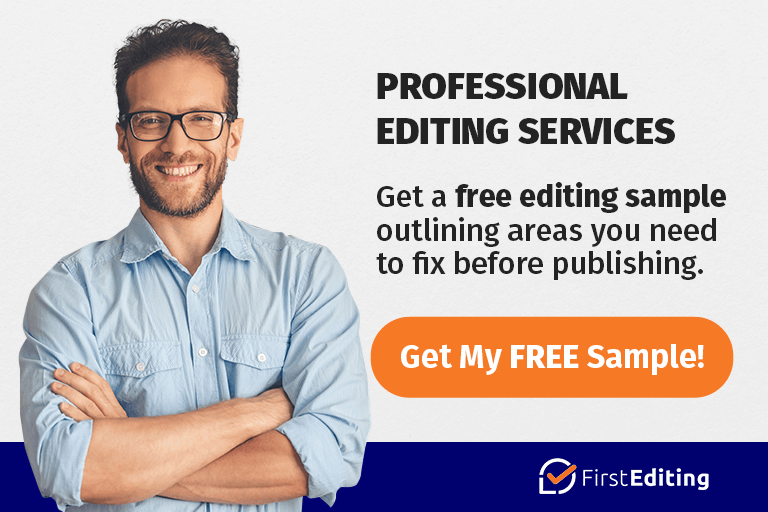What is the difference between editing vs proofreading?
When comparing editing vs proofreading be aware of their unique differences. First, make sure you know what is the difference between editing and proofreading. Decide what you need to complete before sharing, submitting, or publishing your final document.
Many authors use the terms editing and proofreading interchangeably. However, this is incorrect.
Proofreading services vs editorial services are completely unique and separate. These are provided by professionals to improve your writing. Each stage of corrections is essential. Therefore, always approach editing separately from proofreading to ensure nothing is overlooked.
Let’s compare these writing services. First, let’s determine what is the difference between editing and proofreading once and for all. Afterwards, you may then seek professional editing or proofreading help for your writing as needed and desired.
What makes proofreading distinct from editing?
Proofreading is the ultimate review of your written presentation. A proofreader fixes your spelling, grammar, punctuation, formatting errors, writing consistency, etc. We provide a “proof” on your final draft after formatting.
However, your professional proofreader will not rewrite or reduce your overall word count. Proofreading deals only with your finished manuscript. It is the simple polishing of your words.
Your professional proofreader’s ultimate goal is to provide an error-free manuscript. Additionally, proofreading does not require in-depth collaboration with the writer. Thus, you submit your presentation as is and a proofreader begins immediately.
The turnaround time for a professional proofread is quite fast. Submission is quite simple. Delivery is straight-forward.
What makes editing separate from proofreading?
Editing is much more comprehensive than proofreading. Editing reviews your writing’s overall construction, readability, language clarity, and tone. Your professional editor helps you create a smooth presentation.
Editing is an evolving process. It happens multiple times with various revisions during different stages of development. It is important to compare the different levels of editing with your comprehensive writing process and ultimate goals.
Unlike proofreading, your professional editor may provide rewrites and reduce the word count, if necessary. Of course, this depends upon your requests and which level of editing you are completing. It is important that you compare editing levels. If you are unsure what editing level you need, ask for a professional evaluation of your writing first. You can receive this with a free editing sample of your writing.
Your editor’s goal is to improve your quality of writing while remaining aware of the entire presentation. Editing is performed according to which level of editing you need and want. All editing levels require clear and comprehensive cooperation, communication, and confirmation from you, the author.
You must provide instructions, individual requirements, style guide details, unique concerns, your preferred English type, subject matter confirmation, genre description, audience desired, and the ultimate purpose of your presentation. These are important.
Share these details and more with your editor. They can then help you achieve your goals. Working with an editor results in an engaging manuscript which connects you with your reading audience.
Your editing delivery time depends upon these factors. Your editor will spend more time providing a comprehensive structural edit than a standard copy edit. Allow time for them to dive deeply into your assignment.
Editing vs Proofreading – what do you need?
Ask for a free editing sample and professional recommendation of services. Professional editors can quickly assess your manuscript. They will determine what you need professionally and evaluate what editing level you want personally from your instructions.
If you are ready for proofreading, a professional editor can confirm this. If not, they will outline specifically what level of editing you need.
When do you need editing help?
You need editing when
1. You require assistance with readability, coherency, flow, clarity, and tone. You do not feel confident in your basic spelling, grammar, or punctuation. You often struggle with writing, structure, or syntax.
2. You desire affirmation that your writing is good. You want confirmation from a neutral, professional.
3. You are frustrated or bored with self-editing. You need neutral help in assessing the strengths and weaknesses of your manuscript.
4. You are writing and editing in one of these stages
a. Content editing includes substantive, structural, and developmental editorial corrections of your initial draft. Content editing varies by your genre and subject matter.
b. Line editing focuses the line-to-line details of your writing. Your editor provides a page-by-page review of your writing. They look for clarity, consistency, and effective tone within your writing details ensuring engagement with your audience If you are confident in your overall presentation, but still need professional editing, request line editing. Line editing is the industry standard and most recommended for confident writers.
c. Copy editing provides the final review of punctuation, grammar, spelling, and style. A copy edit is more mechanical review and correction before formatting.
When do you need help proofreading?
You need proofreading when
1. You are confident with your manuscript and writing. You know your manuscript requires only a basic proof. You are seeking a final review and correction of only misspellings, punctuation errors, and typos.
2. You have already completed the entire editing process. You are “done” with editing.
3. You have no further changes or revisions to complete. You are satisfied with your composition, and you feel ready submit your manuscript.
When to use professional editing services
Professional editing services provide assurance and support whenever you want or need additional insight into your manuscript or writing skills. Editors fix, assess, and convey feedback which allows you to become a master wordsmith.
A professional editor is not only your final defense against errors. An editor is also an extension of your writing. Thus, working with an editor provides valuable coaching while you learn the intricacies of correcting your words.
Often, authors become lost in their writing and require a neutral set of trained, editorial eyes to review the presentation. Editors assist with syntax and style during the structural and creative phases.
There is no specific time when you must hire an editor. However, never skip editing. You can’t afford not to edit. Words are powerful and presentation is important.
Editing is your best investment. Your invested energy, time, and reputation is conveyed within your words. Ensure you make the best first impression and presentation. Make sure you convey your ideas clearly and engagingly to your readers.
Hire a professional editor today. Eliminate all errors, confusion, and inconsistencies. Safeguard your presentation from unnecessary scrutiny. Last, grab your audience’s attention with your unique voice and avoid ridicule or doubt due to syntax errors.
Read more about how to self-edit by a professional editor.




















